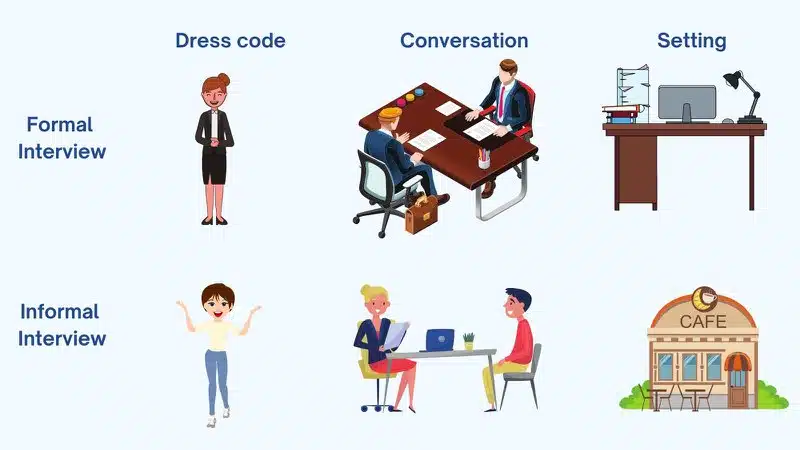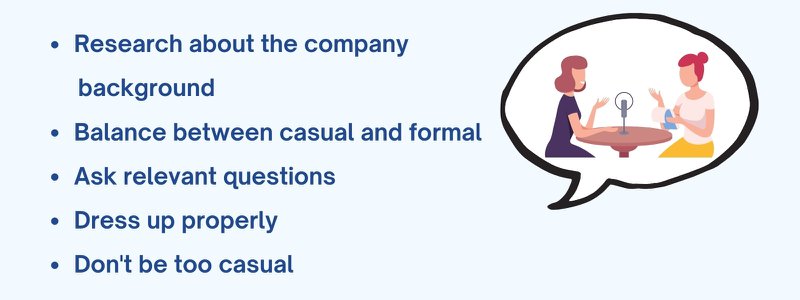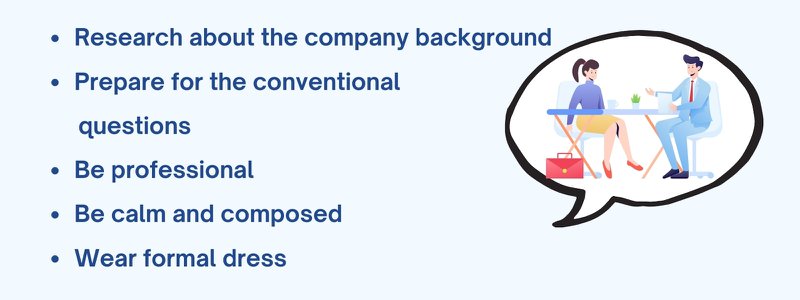
Over the years, the recruitment process employed by top companies has undergone a lot of change. Everything from applying for a job to getting the offer letter is nothing like it used to be. The emergence of the internet has had a significant effect on how companies recruit. Similarly, the interview processes have also changed and have been categorized into two categories: formal interview and informal interview.
The traditional interview method, also known as the formal interview, is no longer the only interview method. A lot of companies are now opting for the more casual interview method known as the informal interview.
Both formal and informal interview types involve a conversation between the employer and the potential candidate, but they are vastly different in structure.
So, what does it mean for the candidate? How should a candidate approach an informal interview? And what are the tips for succeeding in a formal interview?
Before we get into the thick of it, let us start by understanding formal and informal interviews and the factors that make them different.
What Is a Formal Interview?

A formal interview is a meeting between an employer and a potential candidate that always takes place in a professional setting. It is the traditional form of an interview that has been the norm for decades. A formal interview will usually occur in the employer’s office building, and the interview structure is strictly professional.
Everything ranging from the dress code to the conversation is usually professional in a formal interview. The purpose of a formal interview is for the employer to decide whether or not the applying candidate is good enough for the vacant position.
Some employers might decide to hold a formal interview over dinner in an informal setting, but the candidate must dress up formally. The attire of the candidate is a significant factor in a formal interview.
Similarly, the candidate must maintain his/her professionalism throughout the formal interview. Even though many companies are opting for an informal recruitment approach, traditional interviews are still the norm for the recruitment process.
Most companies still opt for the trusted formal interview type. They might also expect candidates to respect the professionalism required to participate in one. But the other type of interview has gained a lot of traction lately.
Let us see what an informal interview is and what purpose does it serve.
What Is an Informal Interview?

Informal interviews are different from traditional interviews. They take place in a casual setting, and the structure is also vastly different from a traditional interview. The dress code is nowhere near as strict as in the formal interviews.
When it comes to the purpose, it is usually an attempt by the employer to check whether or not a candidate is the right fit. The interviewer might also indulge in casual conversation during an informal interview to get an overview of the candidate’s personality and attitude. The candidate also has a lot of room to clear his/her queries and learn about the company.
Another feature of the informal interview is that there is no specified duration. An informal interview is a chat over lunch or coffee between an employer and a candidate. Such an interview can go on for a long time if the candidate makes an intriguing impression.
From the candidate’s point of view, an informal interview provides a lot of time to make a good impression and understand the job profile and the company’s ethos.
Furthermore, conversation in an informal interview is never strictly technical and can range from technical discussions to hobbies and stuff.
How Is a Formal Interview Different From an Informal One?
A formal interview is the most common form of the interview. It is the traditional form of interview wherein an employer and a candidate converse in a professional environment.
On the other hand, an informal interview usually takes place in a casual atmosphere. In an informal interview, the employer might have a chat with the potential candidate over coffee.
The difference: dress code, conversation, format, and purpose

Similarly, there is a strict dress code when it comes to formal interviews. For instance, you cannot turn up in ripped jeans for a formal interview. In contrast, the dress code for an informal interview is nowhere near as strict. Remember, you can’t put on ripped jeans for an informal interview! But there is a lesser impetus on candidates to put on strictly professional clothes.
The conversation in a formal interview is strictly technical and mainly about the job profile. In an informal interview, the employer tends to talk about various topics to get a sense of what the potential candidate offers in terms of business intelligence, work ethic, and more.
Informal interviews also give candidates a lot of room to express themselves, while formal interviews are relatively limited in that sense. There is little time for candidates to provide long, in-depth answers to the questions in a formal interview.
Even though the format and structure of formal and informal interviews are vastly different, the core purpose remains the same.
The only difference in purpose among the two is that the employer sees whether a candidate is technically capable of the job in a formal interview. On the other hand, an informal interview is about employers trying to get an overview of what the potential candidate will offer in various ways, ranging from dedication to technical skills.
Hence, a candidate would always prefer an informal interview as it gives him more space to unwrap and express. From the candidate’s point of view, an informal interview provides a better platform, but it has not become the norm yet. The traditional form of the interview still remains the most used, and job seekers should be prepared for both types of interviews.
Preparing to Succeed for an Informal Interview
Informal interviews usually take place in a casual setting. But there is nothing casual about preparing for one. As a candidate, you must ensure that you do not undermine the importance of an informal interview.
So, here are some essential tips to prepare for and succeed in an informal interview.

Research about the company
The bulk of your preparation for an interview is the research. Gather as much information about the company as possible and try to get a sense of what the company is all about.
A significant objective of informal interviews is to check whether or not the candidate is genuinely interested in working with the company. Make sure you don’t come off as someone willing to work for a company you know very little about.
The balance between casual and formal
During an informal interview, candidates often make the mistake of speaking too freely. The casual nature of an informal interview lures them into saying unprofessional things.
For instance, slandering your coworkers at the previous job or being too pessimistic about the industry can cost you the job. Try to strike the perfect balance between casual and too formal!
Ask relevant questions
Whenever a company approaches you for an informal interview, don’t make the mistake of thinking that you’ve already got the job. Go with relevant questions of your own such as why they approached you or what roles they want you to play in the company’s growth.
Don’t get carried away with too much casual conversation during an informal interview. Ensure you listen closely to the employer about the company’s ethos and follow up with your questions.
Dress up properly
Dressing for an informal interview is also an area where candidates often go wrong. They either go too formal out of fear or make the mistake of turning up in unprofessional attire. Business casual is the best option when it comes to informal interviews. Even if the interviewer turns up in a very laid-back dress, do not forget it is your interview, not theirs. Whatever you choose, do not overthink your attire during the interview!
Don’t be too casual
Lastly, do not forget to carry stuff to make notes in. A standard notepad would be suitable, along with copies of your resume and your portfolio. Make sure you do not take too much paperwork to fit in with the nature of an informal interview.
Preparing to Succeed in a Formal Interview
Formal interviews are the traditional interviews that you keep getting tips for. But over the years, formal interviews have changed a lot in terms of structure. Hence, whatever tips for success you choose to follow for formal interviews, make sure they are in touch with today’s business world.
Here, we list tips to succeed in a formal interview and approach and prepare for one.

Research about the company
As with every interview, formal or informal, your research has to be good. Try to gather as much relevant information about your employers as possible and take a fresh look at the job requirements to present yourself confidently. It would help if you also had many relevant questions of your own to make a good impression on the interviewer.
Prepare for the conventional questions
Another handy preparation tip for formal interviews is rehearsing answers to the most common interview questions. Remember, it is the most common questions such as “tell me about yourself?” that catch candidates off guard and cost them the job. So, make sure you practice answering these questions professionally and concisely.
Do not rehearse cliché answers to the typical interview questions. Try to be authentic with your answers and be concise. Interviewers hate to hear the same old rehearsed lines, and they are always looking for candidates who bring something fresh and unique to the table.
Be professional
A candidate should stay professional throughout the interview. It does not matter how casual or informal the interviewer gets; you should never drop your guard and always be your professional best.
Furthermore, from the moment you enter the office building to the moment you leave, make sure you are polite and respectful to everyone you come across. These factors often go unnoticed but are sure to paint a positive picture of your personality in the employer’s eyes.
Be calm and composed
With all the pressure that comes with trying to find a job, your stress levels might play foul on the day of your formal interview. Make sure you use calming techniques that have always helped you in staying calm and composed.
The last thing you want is to watch all your preparation go waste because of the stress you have been dealing with. Whenever you feel nervous, do not hesitate to walk while waiting for your turn.
Wear formal dress
There is no margin for error when it comes to dressing up for a formal interview. You have to look your professional best if you are to make an impression that lasts. After all, the tidiness and professionalism of your attire give the very first impression of your personality.
The same goes for your behavior during a formal interview, as you can be nothing but professional in your language and the way you interact with the interviewer.
A Blend of Both Interview Types
Both the formal and informal interview types have their pros and cons. While the traditional interview method is a trusted one, the informal interview type gives employers a much better insight into the candidate’s personality and attitude.
From the candidate’s point of view, both interview types provide an opportunity to make a good impression. An informal interview gives candidates more space to express themselves and talk in detail about themselves professionally and personally. Many companies are opting for a blend of both interview types to get the best of both types.
Hence, as a job seeker, it is better to be prepared to succeed in both interview types. The tips mentioned above will go a long way in preparing you for a good interview. Ensure you do your research and prepare for both types of interviews to turn up with confidence whenever necessary.
After all, whatever the interview type is, good preparation is sure to give you the desired results.
If you want to learn more about job interviews, check our topics below:
- Preliminary Interview: Meaning, Purpose, And Tips To Ace It
- What Is A Working Interview And How To Outperform In One?
- What are Formal And Informal Interviews? How to succeed?
- Remote Interview: 14 Tips For a Successful Interview
- Interview Outfits: What To Wear For a Successful Interview
- What Are Open Interviews? 10 Ways To Ace Them
- Types Of Interviews And Ways To Ace Them
- 10 Indispensable Tips For a Successful Job Interview

Christian has over ten years of experience in marketing agencies. Currently, he has been dedicating his time to a tech startup and also writing for major publications. He loves podcasts and reading to keep up with the latest trends in marketing.
